How Can MY Instructional Leadership Get Us Through This Year?
Imagine, for a moment, that local officials announce yet another change to the school year:
- Perhaps you’re going all-virtual—again...
- Or perhaps your hybrid re-opening is getting pushed back...
- Or perhaps the entire cafeteria staff will be quarantined for two weeks.
You roll your eyes, then roll with the punches: you’ll get through this, one way or another.
But teachers' patience is growing thin.
They're exhausted.
They don't feel successful.
All the uncertainty is creating fear and anxiety.
They're getting whiplash from the endless changes.
Should we just back off and leave teachers alone?
One principal shared on Facebook:
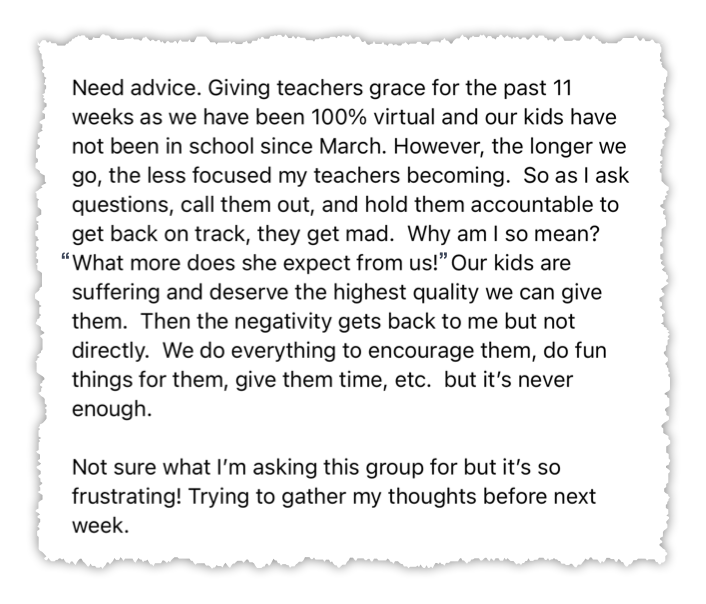
Teachers are stressed to their limits—and administrators are, too.
Should we just skip instructional leadership this year, so we can focus on survival?
That's one option...but what if the best way to help people survive isn't to lower expectations and "give teachers more space"?
What if the best way to survive this school year as a school is to double down on the fundamentals?
What if surviving this year is all about instructional leadership?
Instructional Leadership Will Get Us Through—
But Only If We Get It Right
This is a year to treat ourselves and others with a LOT of grace...but NOT a year to ease up on instructional leadership.
In fact, it's a year when the right instructional leadership practices are precisely what will get us through.
But we don't need more of the same, old-fashioned, high-stakes formal observations and goal-setting—either in person or in "virtual" form.
Really—has anyone said "Please come observe me and tell me what I'm doing wrong"? Or "Please fill out some forms to rate my skills on a rubric developed for a totally different kind of teaching"?
Probably not—that's not what teachers need right now.
The kind of instructional leadership that will help us survive and thrive through '20-'21 is based in something far simpler and more fundamental to our needs as humans:
Conversation.
Conversation is powerful in times of upheaval, because it allows us to:
- Share information
- Maintain relationships, and
- Collectively make sense of what we're experiencing
It thus allows us to make decisions about how to solve our biggest and most urgent problems—the key task of instructional leadership.
Not just casual chit-chat conversations (although they're important)....
Not the old-style formal observations, with formal meetings and formal forms to fill out...
Nor those deep, philosophical conversations that remain abstract and divorced from practice.
The kind of leadership that will get us through this year focuses on evidence-based feedback conversations—same as always...
...but focused on the key priorities that will help us survive the extreme stressors we're facing this year.
The Stressors Pushing Educators To The Limit
Our instructional leadership must be different this year, because the stressors teachers are facing are different.
In a profession where one year is usually the same as the last, a big stressor is uncertainty—we have a lot of unknowns, and there's no end in sight. Teachers are looking to us for answers, but we don't always have them.
It's making us all feel like first-year teachers all over again.
Another stressor is overwhelm. One leader recently shared:
Not enough hours in the day...I don't have an AP...the paperwork doesn't stop and that's a struggle.
What's keeping me going? Honestly not sure. Usually working during 95% of my awake time. Telling myself that I will take some "me" time. Seeing teachers feel the same and do the same motivates me to want to keep up.
Leaders are also bearing the second-hand burden of other people's stress, whether it's from overwhelm, fear about COVID, challenges with virtual teaching, or guilt about not being able to do enough for our students.
That's another big one—guilt that no matter how hard we try, virtual learning doesn't work for many students.
"I love having students back on campus!" one leader shared. But then...they don't stay. The district goes all-virtual again.
And even when we are on campus...it's just not the same.
We're all eager to get back to normal. But it'll be a while, and we can't spin our wheels while we wait.
Schools need real instructional leadership—right now.
More old-fashioned, top-down observations won't solve these problems.
But instructional leadership will.
What Is Instructional Leadership, Really?
At The Principal Center, we define it like this:
Instructional leadership is the practice of making and implementing operational and improvement decisions in the service of student learning.
If that's our definition of instructional leadership, it makes sense that conversation is at the heart of it.
We need to engage in conversation with teachers now more than ever, since the casual interactions we'd normally have around campus aren't happening to the same extent:
- In the staff lounge
- In the hallway
- At the copier
These conversations are essential for maintaining relationships—and the flow of information that's so crucial for the decisions we have to make as leaders.
So this year, let's make conversation our top priority...
...and let's drop the pretense that's holding us back: the pretense that our suggestions are our most important contribution as instructional leaders.
It's Time To End The "Fake Feedback Game"...
Because It Never Worked Anyway
Instructional leadership is about making and implementing decisions, NOT about providing suggestions.
For too long, we've allowed the practice of rich professional conversation to get distorted by a false belief: the belief that teachers need our suggestions in order to improve.
"You did X...have you thought about doing Y? Why don't you give that a try, and let me know how it goes?"
Let's call this the "Fake Feedback Game." It's a game we've been playing forever, with clear roles:
- The instructional leader observes and provides feedback
- The teacher gets observed and receives the feedback
In the Fake Feedback Game, there's usually a predictable "sandwich" structure:
- First, there's a compliment to acknowledge something the teacher's doing well
- Then, there's a suggestion for improvement—the "meat" of the feedback sandwich
- Finally, there's another compliment, to make the teacher feel good and end on a positive note
It's a massive formality—complete with actual forms.
This game makes us feel like we're playing well-defined roles, so it's somewhat comforting, but there's a problem.
The problem is...it doesn't work! The Fake Feedback Game doesn't change practice—because it gets our roles wrong.
If the observer is making all the decisions about what the teacher should do differently...how is the teacher ever going to make better instructional decisions?
Instructional leadership is all about making and implementing decisions...but so is teaching!
Leaders can't do the deciding for teachers—but we can engage teachers in rich, evidence-based conversations about practice—conversations built on a shared vocabulary that allows leaders to transfer insights and improvements from one classroom to another.
Doing better isn't about doing more.
It begins with letting go of practices that no longer serve our needs.
Right now, we need to drop the old-fashioned "Fake Feedback Game," so something new and better can take its place.
And we need to drop the guilt.
If you've been leaning into traditional supervision and evaluation harder than ever...only to feel more and more frustrated that it's not helping...you're not alone, and it's not your fault.
If you've been feeling guilty because you haven't been in classrooms much this year—physically or virtually—it's OK.
Let it go, and let's get started on a better plan...
...a plan centered around professional conversations with each teacher.
If you want to make teachers feel less overwhelmed, less anxious about uncertainty, and less guilty about what we're NOT able to do for students...focus on conversation—NOT giving more suggestions.
Supporting teachers, this year, is about giving permission, not suggestions:
- Permission to do less, and make the job more doable
- Permission to set boundaries, and go home at a reasonable hour
- Permission to stop feeling guilty about everything we can't do well right now
You can say all these things in a newsletter or all-staff email, sure—but the best place to really give teachers this kind of permission is in 1:1 conversations about practice.
There's No Time for the Wrong Kind of Instructional Leadership
If you're feeling guilty about not making enough time for instructional leadership this year, it's OK.
What you've been doing instead—supporting teachers—is probably much more important than the outdated practices that no longer fit.
Let's be honest: a different year requires different actions from instructional leaders.
Teachers are dividing the work with their teammates more than ever—there's no time to reinvent the wheel or work in silos.
They're also playing new roles in the classroom—more "curator and docent" than "sage on the stage."
These are great changes, but they're a lot for teachers to navigate, and they have major implications for us as instructional leaders.
The traditional feedback process isn't what teachers need right now. It doesn't make them feel supported, and it doesn't change practice. (In fact, it never really did.)
We have an opportunity to do better, by figuring out what this moment demands of us.
Get instructional leadership right, now, and it'll carry you through whatever this year brings—and our eventual return to normal.
More importantly...getting these fundamentals right will make us dramatically better at solving the most pressing problems of the moment:
- The sense of exhaustion and overwhelm
- The sense of fear and uncertainty
- The sense of guilt and futility when we can't fully meet our students' needs
As instructional leaders, we can—and must—directly address these challenges with our teams.
The first thing to get right is our feedback conversations:
- For starters, we need to be having them—probably a lot more often than the norm in your district.
- Second, they need to be evidence-driven—even if that evidence takes a very different form.
- Third, they need to based on shared language (which we can develop through these conversations)
When we get these fundamentals right, we can keep the vision alive, keep people moving forward, and solve our biggest problems—together.
"But I Don't Have Time for One More Thing!"
You might be thinking "This sounds great...but I really don't have time."
Agreed. You have so many day-to-day problems to solve, and systems to run, and people to support—there's no time for anything that falls into the "important but not urgent" quadrant.
But what if 1:1 conversations with teachers were precisely what allowed you to solve the myriad problems you face each day?
What if the information and relationships that stem from these conversations were precisely what you've been missing?
And what if they didn't take up any more time than what you're currently doing?
It's not a hypothetical. It's what instructional leaders around the world are already doing.
Introducing the Virtual Instructional Leadership Challenge
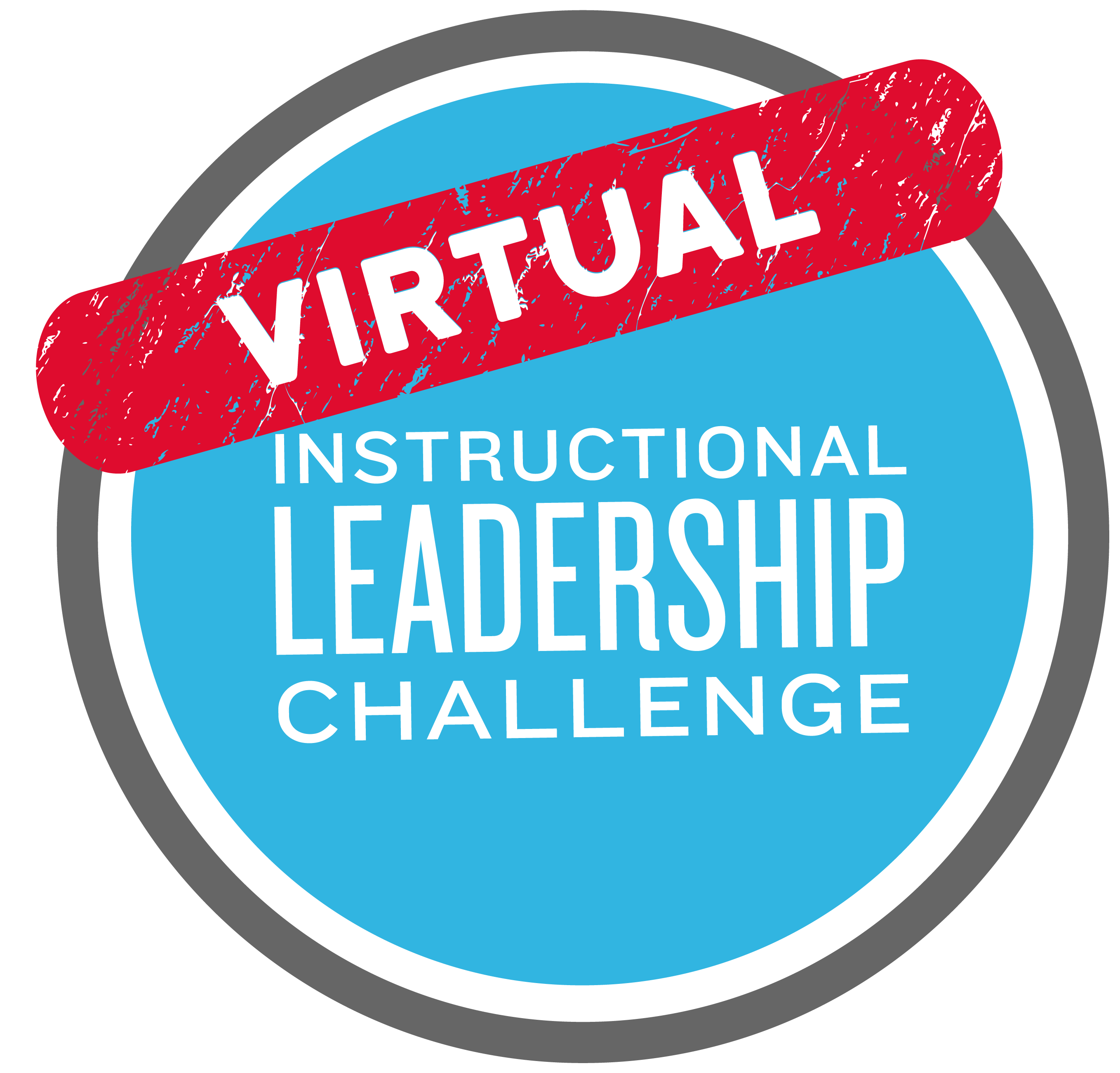
In the Virtual Instructional Leadership Challenge, you'll discover a new approach to leading learning. The program is broken into six action-oriented modules:
How Instructional Leaders Drive Improvement
Evidence-Driven Instructional Leadership
Leading Learning through Professional Conversation
Developing Instructional Frameworks
Creating Bandwidth for Instructional Leadership
Aligning Teacher Practice Organization-Wide
You'll also discover:
- Why it's time to banish observation checklists and forms forever—and what really works for aligning practice organization-wide
- How to solve the biggest problems students are facing FIRST
- How to spread best practices for virtual learning from one department to another (even if teachers think they have nothing in common with their colleagues down the hall)
Bonus Modules
The Virtual Instructional Leadership Challenge includes these bonus modules, which aren't available anywhere else at any price.
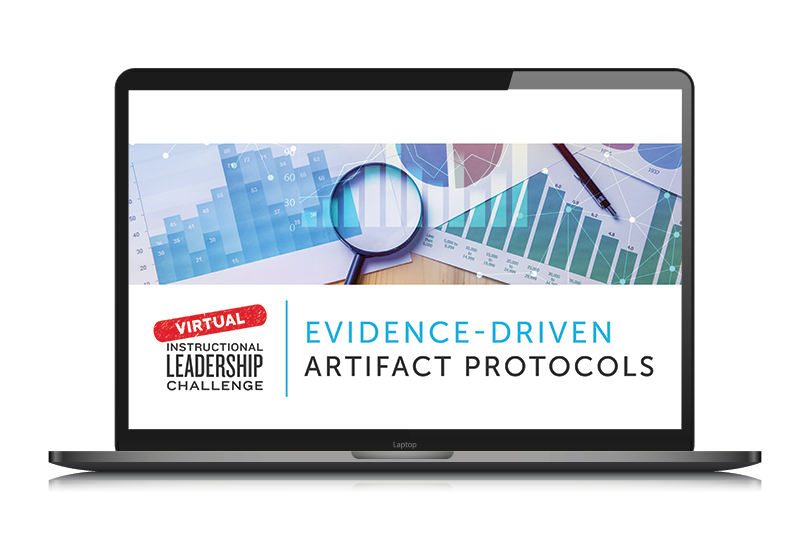
Evidence-Driven Artifact Protocols
for collaborative examination of non-observation evidence
One of the biggest opportunities for improvement lies in examining other forms of evidence than direct observation. When we talk about student work, teacher-curated learning objects, teacher-created artifacts, and other forms of evidence, we can have richer conversations about practice.
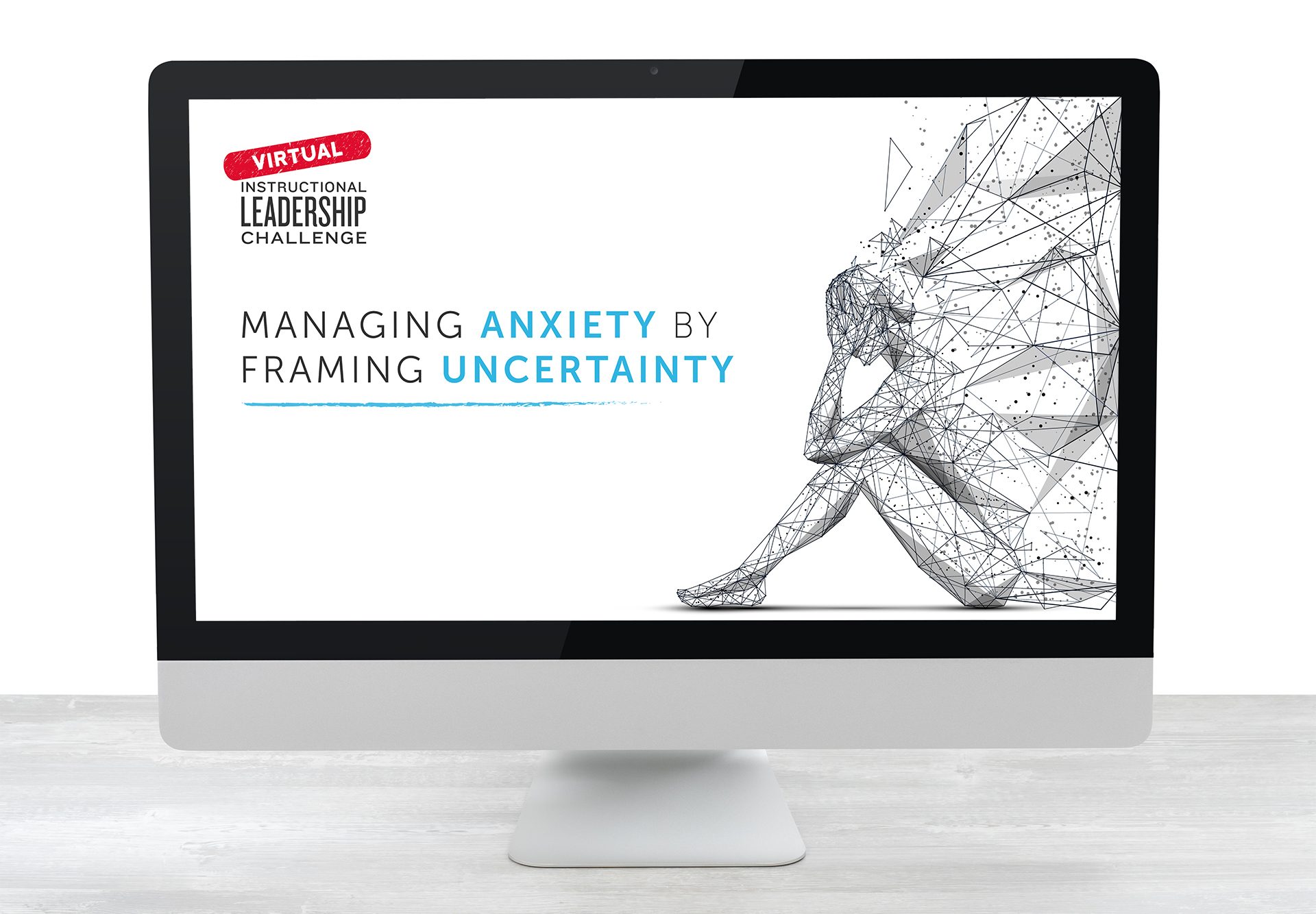
Managing Anxiety by Framing Uncertainty
Help your staff deal with the unknown
This year, many decisions are out of our hands—but they don't have to be a complete mystery. By framing uncertainties in terms of what we do know, you can reassure your staff and keep people moving forward.
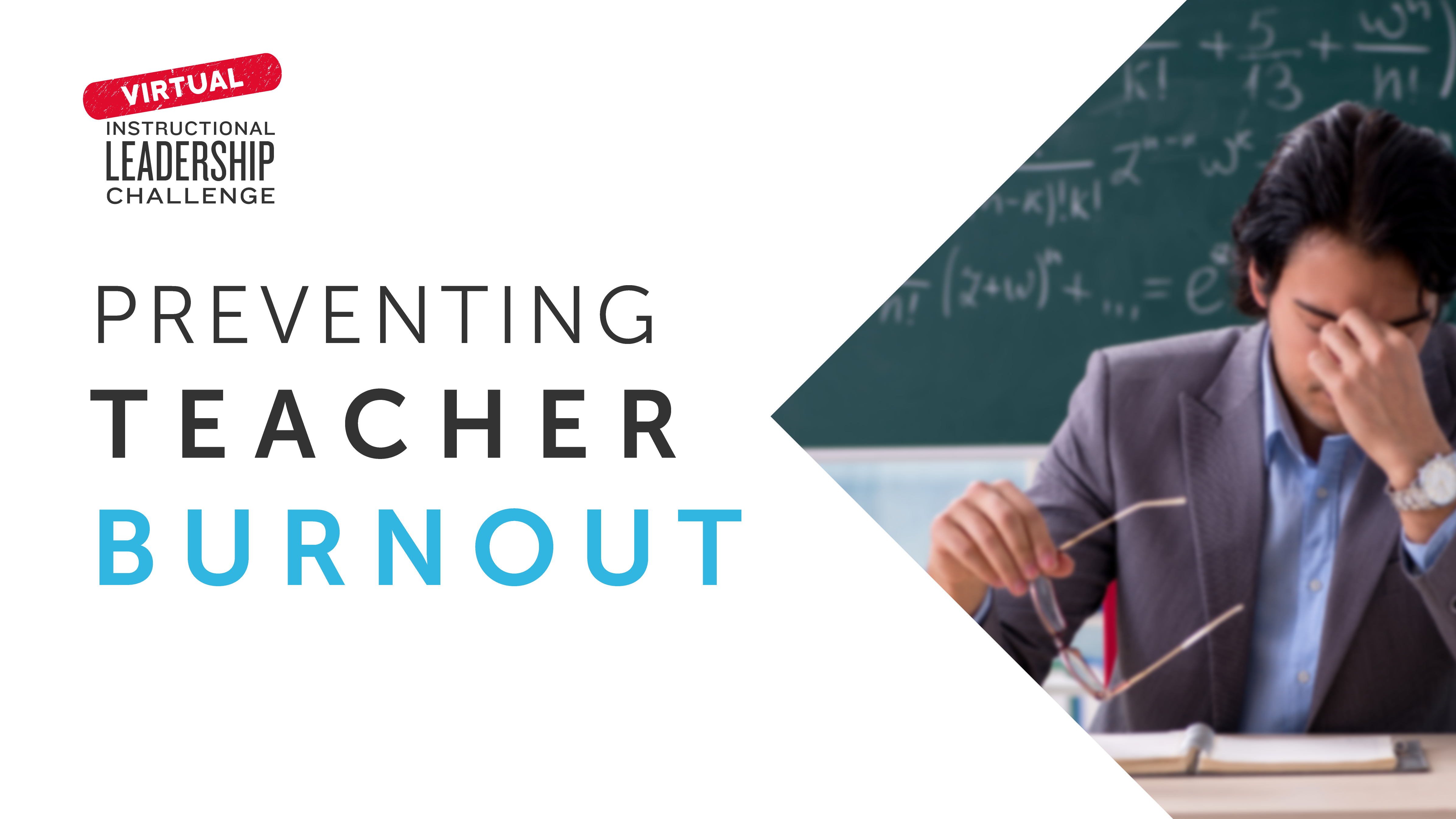
Preventing Teacher Burnout
Help teachers set boundaries and stay in the game
Teacher burnout and turnover are one of the greatest risks teachers are facing right now. In this bonus module, you'll get a framework and action steps for helping teachers create the healthy boundaries that will keep them in the profession and help them thrive in their roles long-term.

100% "This Changes Everything" Guarantee
I’m so confident that the Virtual Instructional Leadership Challenge will be a game-changer for you that I’m backing it with an unconditional, no-questions-asked 100% money-back guarantee. Give it a try—you can go through the whole program, or just skim the transcripts. It either changes everything for you, or you can simply ask for a refund within 30 days—no hard feelings, and no hassles—just email our customer service team or leave us a voicemail at 1-800-861-5172, and we’ll take care of it immediately.
Justin Baeder, PhD.

Director, The Principal Center
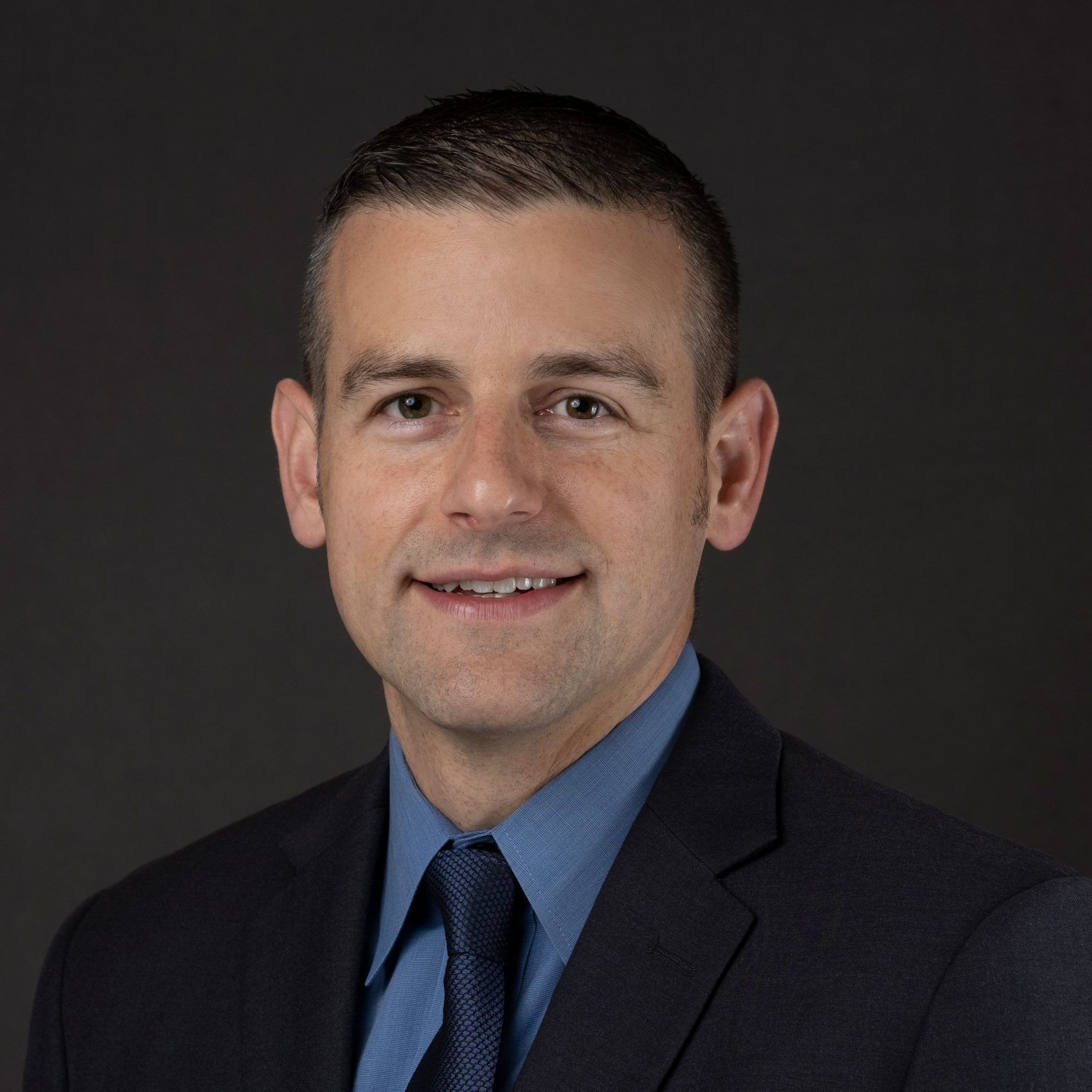
Register
Frequently Asked Questions
The VILC is our all-new flagship program on changing teacher practice—even when normal face-to-face teaching isn't happening.
It specifically focuses on using alternate forms of evidence in feedback conversations, so you can make decisions that will improve learning while making teachers more successful and less overwhelmed.
In an unpredictable year, we need instructional leadership more than ever—the specific kind of leadership you'll discover in the Challenge—so teacher practice can adapt quickly to changing circumstances and student needs.
The Virtual Instructional Leadership Challenge is designed to work in concert with your existing teacher evaluation system, not replace it. While we recommend a leveled teacher evaluation rubric like Charlotte Danielson's Framework for Teaching, you'll learn how to develop rubrics for specific practices of focus, regardless of your evaluation criteria—and even if teacher evaluations are modified or suspended this year.
Yes, you can register yourself or a group on our registration page. Just list all of the participants—including yourself, if you'll be participating—in the large box that asks for first name, last name, and email. You can also provide contact information at a later time.
Yes, we offer a 25% discount for groups of 2 or more. You can register up to 10 people on our registration form. For large groups, email [email protected] to request a quote or invoice.
Yes, we'll honor the group rate for anyone in your district/organization—just let us know how you'd like to be billed. For example, two principals on different campuses can be invoiced separately, but still get the group discount. Just let us know—email us at [email protected] or call 1-800-861-5172.
You'll get lifetime access to the Virtual Instructional Leadership Challenge and the bonus modules—there's no expiration date.
The VILC is for school leaders who want to help teachers deal with the:
- Overwhelm
- Uncertainty, and
- Guilt
...they're facing this year. If you want to improve teaching and learning, while making everyone's job more doable, the Challenge will change everything—in fact, that's our guarantee.
If you supervise principals, the Challenge will help you implement these transformations organization-wide.
It's simply this:
I’m so confident that the Virtual Instructional Leadership Challenge will be a game-changer for you that I’m backing it with an unconditional, no-questions-asked 100% money-back guarantee.
Give it a try—you can go through the whole program, or just skim the transcripts.
It either changes everything for you...transforming the way you work with teachers...
...or you can simply ask for a refund within 30 days—no hard feelings, and no hassles—just email our customer service team or leave us a voicemail at 1-800-861-5172, and we’ll take care of it immediately.
Simple: the Challenge is all about taking the right actions (including STOPPING the wrong actions). To give you direct access into the insights and action items from the Challenge, you'll get:
- A step-by-step workbook in PDF and Google Doc format, for handwritten or electronic notetaking and reflection
- Short video sections filmed in full HD, with slides and captions for easy review
- MP3 audio tracks for each section and each module, so you can listen on the go—even when you're not able to look at a screen
- Complete transcripts in searchable, printable PDF format—so you can follow along, review your progress, and even search for a specific key word
If you have a brief commute, run errands on the weekend, or otherwise have non-screen time when you can listen in, the Challenge won't add a minute to your time commitments.
More importantly, you'll discover how to make time for your most important work, so you'll come out ahead even if you set aside time to focus only on the Challenge.
We accept purchase orders as well as direct credit card payments. We can accept international payments via SWIFT wire transfer or credit card, and domestic (US) payments via check or credit card. We invoice on Net 30 terms, and payment in full is required within 30 days of registration.
Please contact us with any questions regarding the vendor approval process in your organization. Vendor information including our W-9 form is available here.
